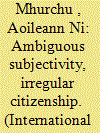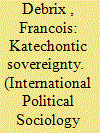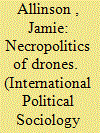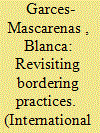|
|
|
Sort Order |
|
|
|
Items / Page
|
|
|
|
|
|
|
| Srl | Item |
| 1 |
ID:
139496


|
|
|
|
|
| Summary/Abstract |
This paper reflects on the recent development of new and innovative ways of thinking about political subjectivity in international politics as flexible and contingent by specifically considering ambiguity (in-between-ness) as an important, yet under-theorized, aspect of how political subjectivity is experienced. It does so by focusing on the question of irregular citizenship, where people get caught between citizenship and migration. Focusing on the constant question mark around citizenship and around the alternative of being a migrant in the everyday life of certain people in the United States and in Europe, this paper unpacks how ambiguity is constitutive of political identity and belonging. It argues that Julia Kristeva's notion of “foreignness” offers a useful way of understanding experiences of being political which escape both citizenship and migration and are instead embodied in stylistic emotions (for example, poetry, friendship, family ties).
|
|
|
|
|
|
|
|
|
|
|
|
|
|
|
|
| 2 |
ID:
139497


|
|
|
|
|
| Summary/Abstract |
This paper analyzes the formation and subsequent securitization of the digital protest movement Anonymous, highlighting the emergence of social antagonists from communication itself. In contrast to existing approaches that implicitly or explicitly conceptualize Othering (and securitization) as unidirectional process between (active) sender and (passive) receiver, an approach that is based on communication gives the “threat” a voice of its own. The concept proposed in this paper focuses on “designations” as communicating rules and attributes with regard to a government object. It delineates how designations give rise to the visibility of political entities and agency in the first place. Applying this framework, we can better understand the movement's path from a bunch of anonymous individuals to the collectivity “Anonymous,” posing a threat to certain bases of the state's ontological existence, its prerogative to secrecy, and challenging its claim to unrestrained surveillance. At the same time, the state's bases are implicated and reproduced in the way this conflict is constructed. The conflict not only (re)produces and makes visible “the state” as a social entity, but also changes or at least challenges the self-same entity's agency and legitimacy. Such a relational approach allows insights into conflict formation as dynamic social process.
|
|
|
|
|
|
|
|
|
|
|
|
|
|
|
|
| 3 |
ID:
139495


|
|
|
|
|
| Summary/Abstract |
At its core, security is obsessed with the survival of the sovereign order. Security tends to see the sovereign's existence as threatened by agents whose purpose is to challenge the life of the sovereign. In this article, I mobilize a theological language about the relationship between sovereignty and security to grasp the place that the question of life versus death, the fact of sovereign violence, and the problem of temporality occupy in past and present modalities of security. The notion of sovereign restraint, captured by the theological concept of katechon, is introduced to suggest that the politics of security is dependent upon a fundamentally violent, uncompromising, and often terrorizing objective: to keep at bay forces of temporal finitude seen as disorder or chaos. Forces of temporal finitude that refuse to abide by the belief in the sovereign's infinity can be described as the eschaton or as agents of eschatological time. Katechontic sovereignty, the sovereign practice intent on holding off finite ends (and on casting away agents of eschatological “terror”), is generative of security operations that involve decisions over life and death, matters of biopolitics versus necropolitics, and encounters between the ontological vulnerability of the sovereign and “terrorizing” agents.
|
|
|
|
|
|
|
|
|
|
|
|
|
|
|
|
| 4 |
ID:
139493


|
|
|
|
|
| Summary/Abstract |
The rapid increase in the use and capabilities of Unmanned Aerial Vehicles (UAVs), or “drones,” has led to debates on their place in US strategy, particularly their use in assassination missions, or so-called targeted killings. However, this debate has tended to focus narrowly on two questions: first, whether the US use of UAVs to assassinate its enemies, including US citizens, is legal, and second, whether drones should be given the autonomy to decide when to kill humans. This paper uses the concept of “necro-politics”—the arrogation of the sovereign's right both to command death and to assign grievable meaning to the dead—as it emerges in the work of Achille Mbembe to criticize the assumptions of these questions. It is argued that debates over endowing drones with the autonomy to kill humans assume that the current human operators of drones work outside of the context of racial distinction and colonial encounter in which they already make decisions to kill. The paper supports this argument with reference to the text of a US investigation into a strike which killed civilians in Uruzgan province, Afghanistan.
|
|
|
|
|
|
|
|
|
|
|
|
|
|
|
|
| 5 |
ID:
139494


|
|
|
|
|
| Summary/Abstract |
Through a detailed case study of immigration policies in Malaysia, this article examines processes of bordering in a country where physical borders do not seem to play a pivotal role. It describes how, in Malaysia, immigration policies neither focus on border control nor pose strict limits on immigrants’ entry but rather seek to curtail immigrants’ presence once in the country. The analysis of this “securitization from within” allows us to make three interconnected arguments. First, no border control does not mean no immigration control. Second, confines or internal borders play a decisive role in the construction and preservation of a cheap, flexible labor force. However, despite the disproportionate power of the Malaysian executive, these confines are systematically challenged by immigrants’ everyday practices either by resorting to illegality or by reentering the country after deportation. Thus, when the contours of legality are very narrow, illegality does not necessarily mean a more subordinated form of existence but rather a way to resist state control. Third, both foreigners and citizens can be deprived of their most basic rights. In this regard, the conventional wisdom that citizenship draws a clearly defined line of exclusion/inclusion proves to be wrong in the case of Malaysia.
|
|
|
|
|
|
|
|
|
|
|
|
|
|
|
|
|
|
|
|
|